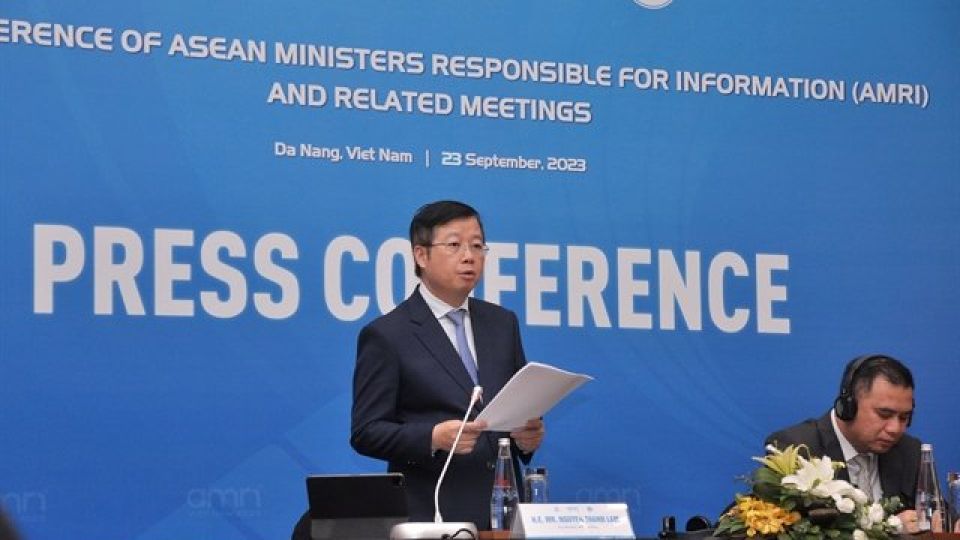September 25, 2023
HANOI – ASEAN Ministers Responsible for Information (AMRI) produced the AMRI Vision Statement on ASEAN 2035: Toward a Transformative, Responsive, and Resilient Information and Media Sector at a conference in Đà Nẵng.
Deputy Minister of Information and Communications of Việt Nam Nguyễn Thanh Lâm spoke at a press conference at the 16th AMRI in the central city on September 23.
He said ministers stressed solutions in dealing with challenges and opportunities from the digital transformation process now and beyond 2025.
“Ministers strongly affirmed the role of information and communications in the new era as information transforms into knowledge and a life-time education while digital awareness improves among ASEAN citizens,” Lâm said.
“They (ministers) underscored the role and contribution by the ASEAN Information sector toward achieving the ASEAN Community Vision 2025 and in supporting the implementation of the respective Blueprints of ASEAN Socio-Cultural Community, ASEAN Political-Security Community and ASEAN Economic Community, and its successor document amidst challenges and opportunities arising from rapid digital transformation,” he shared.
“The meeting reaffirmed the transformative role of media to empower individuals, communities, societies, and to drive passive information consumption toward active knowledge acquisition,” he said.
At the meeting, ministers also called for regional co-operation with all relevant stakeholders including ASEAN Dialogue Partners, academic institutions, and private sectors to promote the social responsibility of cross border digital media platforms in a whole-of-ASEAN approach that leverages innovation and digital transformation, including, but not limited to, capacity building for media professionals, digital literacy and lifelong learning, sharing of accurate information, combatting fake news, research and studies, he said.
Regional ministers also approved the Đà Nẵng Declaration on ‘Media: From Information to Knowledge for a Resilient and Responsive ASEAN’, which recognises the pivotal role of media in contributing to the goal of a knowledge-empowered citizenry, promoting knowledge acquisition as the impetus to foster a resilient and responsive ASEAN Community and an ASEAN Identity to promote social cohesion and deepen a sense of regional belonging in response to the changing media landscape due to digital transformation, the deputy minister told the press conference.
Guidelines on combatting fake news
The meeting also supported the Plan of Action of the ASEAN Task Force on Fake News (TFFN PoA), and the continuous efforts of the information sector in institutionalising a regional mechanism to address the proliferation of asymmetric threats including fake news, misinformation, hate speech, extremist views and radicalisation, he added.
It also endorsed guidelines on the management of government information in combatting fake news and disinformation in the media and seeks to provide a framework on how governments can respond to false or misleading information that is being disseminated in the media or on social media platforms.
The meeting exchanged views on the progress of ASEAN co-operation with the Plus Three Countries (China, Japan and the Republic of Korea) in information and media and the extension of the work plan on enhancing ASEAN Plus Three co-operation through information and media to 2025.
It encouraged ASEAN and the Dialogue Partners to enhance capacity building for media professionals and the sharing of expertise and technical knowledge in utilising digital technology in media production that could level up skills and expertise so as to better seize the opportunities arising from digital transformation.
The ASEAN members expressed their appreciation for China’s efforts to strengthen the ASEAN-China co-operation and new initiatives to further strengthen the co-operation between ASEAN and China.
ASEAN also looked forward to Japan’s support in the review of the ASEAN Strategic Plan for Media and Information (2016-25) and the development of the new Work Plan for ASEAN’s media and information sector.
The regional member states appreciated the initiatives by the Republic of Korea to further advance cooperation with ASEAN in the information and media sector, sharing experiences of disinformation response and AI technologies in the media sector.
In sharing with local media, deputy minister Lâm said Việt Nam urged joint-action from ASEAN members for unity and solidarity in building a powerful information and media industry.
“We will ask digital platforms to comply with laws and the Code of Conduct in each country in ASEAN related to sensitive information. Việt Nam also included the role of ethics for digital media in the joint-declaration as well as moral responsibility standards for digital platforms in business and advertising services,” he explained.
Lâm said the Ministry of Information and Communications had asked smart TV producers to design a button on remote controls that supports viewers searching for truthful sources of information from local mainstream media (including seven key channels and 23 local channels).
He said Việt Nam also included initiatives that boost digital transformation for grassroots media and communications that would help communities in remote and mountainous areas where digital technology infrastructure is yet available.
The meeting agreed to convene the 17th AMRI and related meetings in Brunei in 2025.VNS


